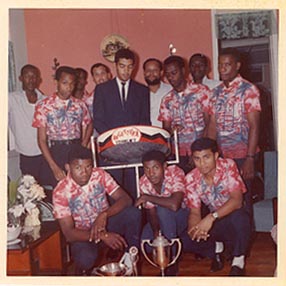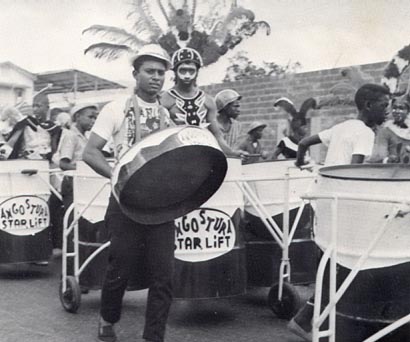Steelband 1960 - 1969
In the early 1960s, the socially unacceptable stigma of the steelband began to change as Whites and East Indians who were attracted to the music joined middle-class Blacks and began playing in steelbands all over the island. At the same time, young, college-educated Black men began to dispel the long-held belief that the steelband was only associated with violence. One of these pioneers was Ray Holman, a self-taught musician who not only played most instruments in the steelband, but also became an arranger for the Invaders Steelband at the young age of sixteen while a student at the prestigious Queen's Royal College (QRC). Holman's breakthrough created an opportunity for some of his college friends to follow him to Invaders. In 1961, he led a small band of QRC students (David "Splav" Waddell, Ian Jones, John "Monty" Williams, Ronald Emrit) in what was the first performance ever by a steelband at QRC. This performance was part of an evening of entertainment that, coincidentally, also showcased the acting and producing talents of another QRC student, Peter Minshall, who would go on to achieve worldwide fame as a masquerade designer/producer. Holman's musical talent was documented for the ages when his 1961 rendition of "I'll Take You Dreaming" from the 1955 American movie The Court Jester was recorded by the Invaders Steelband. This piece of music was labeled "Ray's Saga."
 The early 1960s brought a new innovation with the introduction of the double-tenor: a tenor comprised of two pans. Bertie Marshall of the Highlanders Steelband was credited with the development of this instrument. Anthony Williams' experimentation with the "spiderweb" pan design paid off when his North Stars won the 1962 Steelband Music Festival. Williams was credited with developing tenor-pans with notes arranged in a circle of "fifths" i.e., counter-clockwise, C, G, D, etc. These tenors were commonly referred to as "Fifths."
The early 1960s brought a new innovation with the introduction of the double-tenor: a tenor comprised of two pans. Bertie Marshall of the Highlanders Steelband was credited with the development of this instrument. Anthony Williams' experimentation with the "spiderweb" pan design paid off when his North Stars won the 1962 Steelband Music Festival. Williams was credited with developing tenor-pans with notes arranged in a circle of "fifths" i.e., counter-clockwise, C, G, D, etc. These tenors were commonly referred to as "Fifths."
Independence from England was granted on August 31, 1962, and Independence Day was made a national holiday. Over the years, Independence Day has provided another day of celebration on which steelbands can legally take to the streets, but not many take advantage of the opportunity.
In 1963, Ray Holman moved over to the Starlift Steelband and led his schoolmates back to QRC for a performance of his arrangement of "I Feel Pretty" from the musical, "West Side Story." Holman's mastery of the tenor-pan would later gain him First Place in the Soloist competition in the 1964 Steelband Music Festival. (Ray Holman is shown in the picture above with his 1964 Trophy surrounded by Starlift members and Schofield Pilgrim.) Around the same period, Barbadian-born jazz fanatic Schofield Pilgrim (shown above) began to integrate the pan in his music sessions. A latin teacher at QRC, Pilgrim was able to enlist the services of student Ray Holman for his jazz experiment. Thus, Pilgrim was believed to be the first musician to use pan in jazz music.
 During the early part of this decade, steelbands were still not being adequately rewarded financially for their sacrifices in making the Trinidad Carnival one of the most colorful spectacles in the world. Up to this point in time, only a few bands had sponsors such as Shell Oil and Pan American Airlines. The main source of revenue for most bands to defray the cost of procuring steel drums, tuning the pans, and manufacturing the supports for transporting them on the streets during Carnival was from masqueraders: people who paid for the privelege of dancing or "playing mas" with the steelbands. This presented a new challenge for steelbands to expand in the area of masquerading, and some bands would go on to achieve success in competition for both its music and its mas. (The picture at right shows Carnival Mas and Music - Starlift, 1965).
During the early part of this decade, steelbands were still not being adequately rewarded financially for their sacrifices in making the Trinidad Carnival one of the most colorful spectacles in the world. Up to this point in time, only a few bands had sponsors such as Shell Oil and Pan American Airlines. The main source of revenue for most bands to defray the cost of procuring steel drums, tuning the pans, and manufacturing the supports for transporting them on the streets during Carnival was from masqueraders: people who paid for the privelege of dancing or "playing mas" with the steelbands. This presented a new challenge for steelbands to expand in the area of masquerading, and some bands would go on to achieve success in competition for both its music and its mas. (The picture at right shows Carnival Mas and Music - Starlift, 1965).
The era of Panorama arrived in 1963 with more competition and prize money for the steelbands. With the increasing popularity of steelband music, companies such as Angostura, Coca Cola, Guinness, Solo Bottling Works, Carib Brewery, and West Indian Tobacco became sponsors and began to provide financial assistance. This support arrived not a moment too soon to assist steelbands in defraying the rising costs associated with the purchase of oil drums, tuning, and construction of metal racks.
Under the leadership of Hugh Borde, Tripoli performed at the 1967 World's Fair in Montreal, Canada, following which they were booked for an extensive concert tour and television appearances with the famous American pianist Liberace.
In 1969, Holman again revolutionized steelband music when he changed the traditional "lazy" strum of background pans (guitars, cellos) in his calypso arrangements at Starlift from 4 beats to the bar to a more lively and "jazzy" 3 beats to the bar. Within a short time, all steelbands were using his strum. In addition to the arrangers listed below, other panmen who made significant contributions to the furtherance of the steelband during this decade were tuners Wallace Austin, Rudolph Charles, Allan Gervais and ambassadors Keith Preddie and Errol Zephyrine, and administrator George Goddard.
During the first seven years of Panorama competition in this decade, Lord Kitchener's calypsoes were the most popular with arrangers and were the choice of four Panorama winners in 1964, 1967, 1968, and 1969. In addition to the five winning steelbands listed below (North Stars, Cavaliers, Desperadoes, Harmonites, and Starlift), only five other steelbands finished among the top three during the seven years of Panorama competition in this decade: Dixieland; Highlanders; Sundowners; Tripoli; and West Side Symphony.
| STEELBAND MUSIC FESTIVAL WINNERS: 1960s | |||
|---|---|---|---|
| YEAR | WINNING STEELBAND | SELECTION | TEST PIECE |
| 1960 | Dixieland | Agnus Dei | |
| 1962 | North Stars | Voices of Spring (Johann Strauss) | People of the Islands |
| 1964 | West Side Symphony | Roses from the South (Johann Strauss) | |
| 1966 | North Stars | Poets and Peasants (Franz Von Suppe) | Intermezzo in Eb (Anthony Prospect) |
| 1968 | Trinidad All Stars |
TOP
E-mail to: Ronald C. Emrit
Copyright © 2000-2015 All rights reserved.